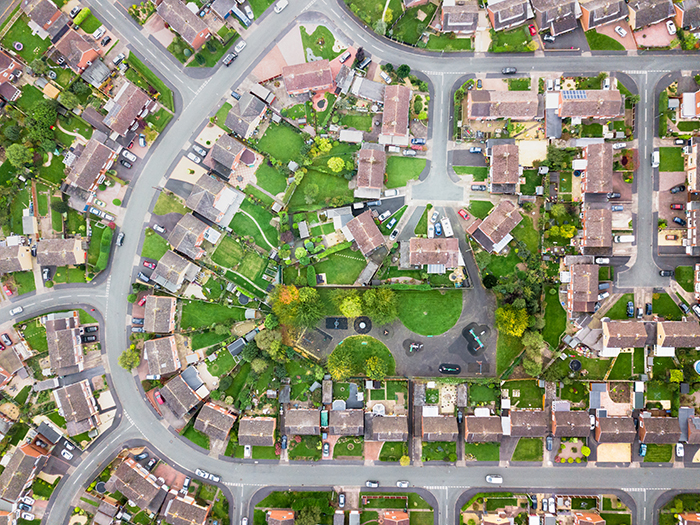
House prices will rise by 5% this year, but homebuyers will come under pressure from rising interest rates and spiralling inflation in 2023 with prices stalling and transactions falling to a 10-year low, according to Hamptons.
The market will end 2022 with prices 5% higher than a year ago after 1.25 million transactions, says the estate agent’s September report, which also includes a four-year forecast.
It says that this year “despite mounting financial pressures on households” market prices have continued upwards.
The report adds: “Given the length of time – currently 123 days – between a sale being agreed and its completion, we are unlikely to see the impact of more stock and higher mortgage rates on Office for National Statistics data until early 2023.”
House prices have climbed this year even though the Bank of England lifted interest rates by 50 basis points to 1.75% last month, its biggest hike since 1995, which raised the base rate to a fresh 40-year high. It was the sixth rate rise since last December.
The move by the central bank comes as it battles rising inflation, which stood at 9.4% in June with the BoE forecasting will hit 13% by the end of the year.
In 2023, the estate agent’s survey forecasts the base rate will peak at around 2.5% early next year making mortgages “noticeably more expensive”. It adds that rising inflation will also eat into how much households can save and limit their capacity to borrow, which will see average house prices “remain the same as they did in the fourth quarter of 2022”.
It says that if interest rates rise higher than 2.5%, due to persistent inflation, house prices may fall.
Transactions will “bear the brunt of the downturn in 2023 as households sit tight”, says the report. It forecasts a 12% fall in transactions to 1.1 million compared to the previous year, the same level as in 2013/2014, with first-time buyers among the hardest hit.
However, 2024 will be “a year of recovery” says the survey, with the base rate falling to around 2%, which will see house prices rise by 2% by the end of the year. Transactions will hit 1.2 million.
It expects that house prices in London will begin to marginally outperform other regions, with growth of 3% in 2024, buoyed by a 5% jump in prime central London properties.
The survey adds that 2024 will mark the end of the current house price cycle which began in 2008.
By the time the current cycle ends in 2024, house prices are set to have risen by 77% across the UK since 2008, with London leading the way with a jump of 110%. However, this is around a third of the capital’s 256% growth during the previous cycle from 1992 to 2007.
The new housing market cycle in 2025 will see prices rise by 3% as base rate settles to “a new normal” of around 1.75%. FTBs, the group hardest hit by higher rates, are “likely to make a comeback, as affordability pressures ease”.
London will lead the way with 5% growth, the survey says.
It adds: “The increase in flexible working seems set to strengthen the links between the capital and southern regions. Their price performance is likely to track that of London more closely in the future.”
In the rental market, the report says that while rental growth is set to cool from record highs set earlier in 2022 (18% in June, according to Goodlord), rents will outperform house prices over the coming years.
Landlords will seek to pass on higher borrowing and other costs to tenants, which will see rents grow by 6% in 2022.
Rental growth will slow to 5% in 2023 and 2024 and should moderate further in 2025 to 4%. Although the survey says the impact of the cost-of-living squeeze on tenants’ salaries “will constrain rises”.
It adds that in London and the South East, where low-yielding landlords will be hardest hit, the market will see the strongest rental growth over the forecast period, running to 6% in 2023, 5% in 2024 and 5% in 2025 in both regions.
Hamptons head of research Aneisha Beveridge says: “All eyes are on interest rates as this will be the key determinant of house price growth in the coming years.
“Given many mortgaged homeowners won’t have witnessed interest rate rises, it will take time for them to adjust. While it’s likely that the base rate will remain lower than it has in the past, higher levels of mortgage debt will magnify the impact of even small rises.
“If mortgage rates surpass the 5% mark, there’s a much stronger likelihood that house prices will fall. With more stringent affordability testing in place since the financial crash and a record share of outright homeowners, we’re likely to see fewer repossessions and forced sales which were key drivers of house price falls in 2008.
“Low-yielding landlords are the group most likely to sell up as they come under pressure from rising mortgage costs and new legislation.
“Longer term, we expect the market to return to its traditional cycle. Price growth will begin to recover in 2024, with London leading the way as a new cycle dawns in 2025. However, stretched affordability will mean we’re likely to see considerably less price growth than in the past.”



